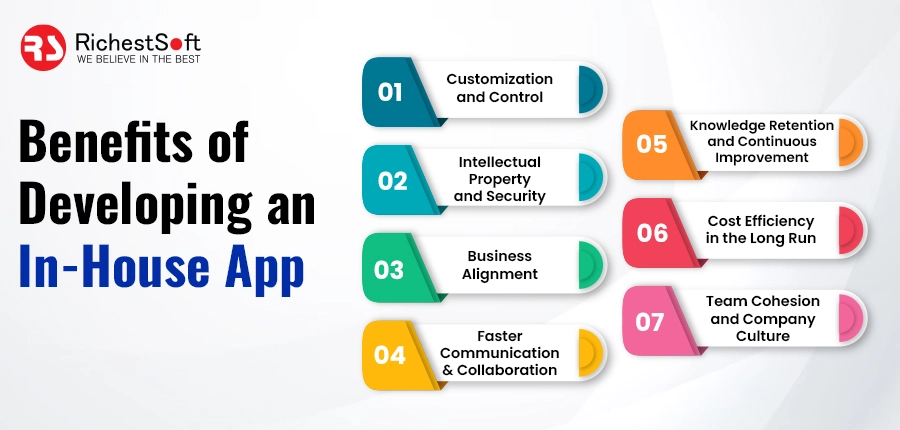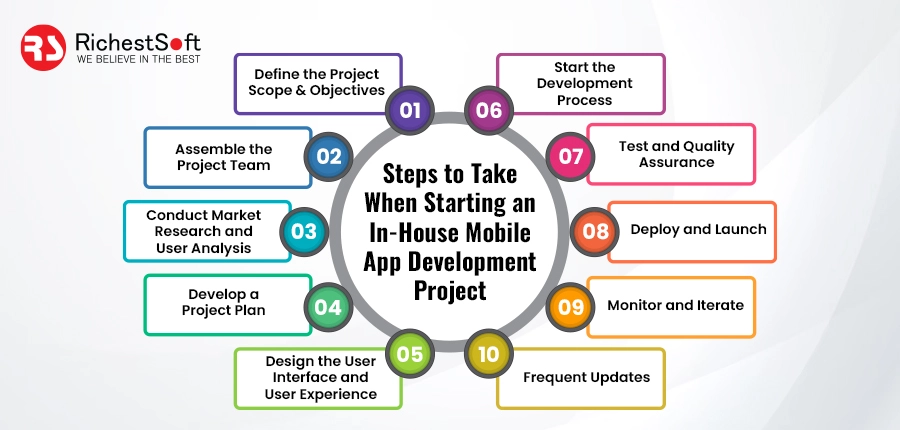Are you tired of depending on third-party mobile applications that fall short of your company’s requirements? Are you prepared to seize the initiative and design a unique app that precisely meets the objectives and vision of your business? You have found it—in-house mobile app development is the solution! It offers various advantages in addition to providing you with total creative control over the appearance and feel of your product. Continue reading to discover why building mobile applications in-house is critical for your company.
What is In-house Mobile App Development?
Planning, producing, and maintaining mobile apps by an organization’s internal team or department is called “in-house mobile app development.” Companies prefer creating mobile applications internally rather than contracting the job to external firms or outside developers.
When building mobile apps in-house, companies have complete control over the app development lifecycle.
They may create their growth procedures, define priorities, and come to conclusions based on the particular requirements of their organization. With this strategy, firms may closely match the development of their apps with their overarching plans and goals.
Benefits of Developing an In-House App

Certainly! Developing an app in-house offers several benefits for organizations:
✅Customization and Control:
Creating apps in-house gives businesses in-depth creative and functional freedom over their products. They may modify the app to conform to their corporate identity standards and user preferences. This degree of individualization guarantees that the app serves the company’s and its users’ needs in a way that no other app can.
✅Intellectual Property and Security:
In-house app development allows businesses to control all data and intellectual property. It makes unauthorized parties less likely to access sensitive information and increases control over security and privacy.
✅Business Alignment:
When apps are built in-house, businesses can ensure their efforts are consistent with their entire strategy and objectives. Employees have an advantage when designing applications for the company’s brand and culture since they already understand its mission, values, and norms.
✅Faster Communication and Collaboration:
Working in the same building as the rest of the firm allows in-house teams to collaborate. It might allow for secure and more frequent iterations throughout
the app development process. Internal teams may work together directly with these groups to guarantee the app meets the needs of all its users, stakeholders, and marketers.
✅Knowledge Retention and Continuous Improvement:

Companies that use their teams might benefit from the skills and experience they gain over time. When the team has been working on an app for some time, they get more comfortable with its codebase, architecture, and function, making it easier to do maintenance and add new features. The collected information might also be used to iteratively modify the app based on user input.
✅Cost Efficiency in the Long Run:
Although developing an app in-house from the beginning might be a costly venture, it could save money in the long run. Organizations may save money on monthly app outsourcing costs and have more say over how that money is used by building an in-house team. Also, they may save money by not hiring as many outside contractors or agencies, thanks to the inside team’s ability to use their knowledge across different app development projects.
✅Team Cohesion and Company Culture:
Developing apps in-house is an excellent way to strengthen corporate culture and encourage employee loyalty. Team members collaborate closely, learn from one another, and bond as a unit. It may help boost employee happiness, collaboration, and commitment in the long run.
Before deciding on in-house app development, businesses must weigh the pros and downsides based on their unique requirements and resources.
Reasons Why You Need to Get Moving on In-house Mobile App Development

Here are some reasons why you need to consider getting moving on in-house mobile app development:
👉Enhanced Control: When you build a mobile app in-house, you have more say over every process step. Because of this, you are in charge of the project and can make instantaneous choices, set priorities, and ensure the app aligns with your vision and company goals.
👉Customized Solutions: The mobile app may be tailor-made to your requirements with in-house development. Your group is familiar with the intricacies of the business and how its users want things to function. With this information, they can design a unique solution to your problems, eliminating any obstacle in the user’s path.
👉Faster Iterations and Updates: The software may undergo more rapid revisions and upgrades with an in-house app development team. Users’ suggestions for new features, improvements, and fixes may all be implemented rapidly. Thanks to this skill, you can remain ahead of the curve and provide users with an app that continually adapts to their needs.
👉Efficient Communication and Collaboration: Having development done in-house allows for more open lines of communication and teamwork between your employees. Stakeholders, product managers, designers, and marketers may all collaborate closely with your development team to achieve a common goal. Working together like this improves coordination and productivity across the board.
👉Intellectual Property Ownership: When an organization creates an app in-house, all legal rights to the software are retained. Everything in the application is yours to keep, including the source code, designs, and changes you make. This ownership allows you to safeguard and exploit your intellectual property as appropriate.
👉Knowledge Retention and Growth: Developing in-house helps your company keep valuable information. Your team will get an in-depth familiarity with the program’s architecture and inner workings. Your company may benefit from sharing, adding, and developing such knowledge.
👉Cost Savings in the Long Run: While investing in development in-house may be more expensive at first, it often saves money. You may save money on long-term app development, maintenance, and support expenditures by keeping such functions in-house instead of outsourcing them. You may also adjust your resource allocation to fit the needs of the project and your available funds.
👉Stronger Security and Data Privacy: When you create anything from beginning to end, you know your information is kept in a secure environment. Your company may reduce the likelihood of data breaches and unauthorized access by developing and implementing security measures specific to its requirements. Users will feel reliable and at ease with this degree of protection.
👉Competitive Advantage: You may get an edge by setting yourself apart via custom app development. Innovative features and capabilities that set your app apart from rivals may be developed if your team thoroughly grasps your industry, target audience, and company objectives. This distinct selling point may help you win over customers and keep them around.
There are many positives to developing mobile apps in-house, but this decision should only be made after carefully weighing the organization’s resources, skills, and long-term objectives.
Steps to Take When Starting an In-House Mobile App Development Project

There are several crucial things to consider before beginning an internal mobile app development project. A comprehensive road map to help you through the procedure is mentioned below:
✔️Define the Project Scope and Objectives:
• Explain the app’s purpose, aims, and audience.
• Determine critical features, functionality, and user experience.
• Determine which platforms and devices the app will support.
✔️Assemble the Project Team:
• Determine project responsibilities and expertise for developers, designers, testers, project managers, and other professionals.
• Hire experts.
• Define team roles and reporting lines.
✔️Conduct Market Research and User Analysis:
• Assess your industry’s mobile app competition.
• Research user preferences, pain spots, and expectations.
• Incorporate insights into design and development.
✔️Develop a Project Plan:
• Establish the project timeframe, milestones, and deliverables.
• Divide development into smaller projects and assign resources.
• Consider risks, dependencies, and contingencies.
✔️Design the User Interface and User Experience:

• Draw app layout, navigation, and interactions using wireframes and mockups.
• Iterate designs using stakeholder and user input.
• Create an app-wide design framework or style guide.
✔️Start the Development Process:
• Choose a app development technique (agile, waterfall) and set up the environment.
• Write clean, modular, maintainable code using best practices and standards.
• Implement project-planned features and functionality.
✔️Test and Quality Assurance:
• Plan functional, performance, and usability testing.
• Thoroughly test bugs and problems.
• Meet app quality and user expectations.
✔️Deploy and Launch:
• Prepare the app for the app store or business distribution.
Optimize app descriptions, images, and keywords.
• Promote and distribute the app to target users.
✔️Monitor and Iterate:
• Use app analytics and user input to enhance.
• Update the app depending on user input and company requirements.
✔️Keep the app fresh with frequent updates
Successful development and release of the app depend on clear and constant lines of communication between all parties involved. Maintain consistent communication with all parties involved, have regular status meetings, and deal with any problems that may develop.
FAQs
Q1: Why should I consider in-house mobile app development when I can outsource it?
There are various benefits to developing custom mobile applications internally. You may directly collaborate and communicate with the development team, have more influence over the development process, and customize the app to meet your unique demands.
Q2: Isn’t in-house mobile app development more expensive compared to outsourcing?
Ans: Although initial expenditures in in-house development may be necessary, doing so may often save money. The potential for extra expenses and delays may be mitigated by keeping development in-house, where more oversight is possible.
Q3: How can in-house mobile app development improve the app’s quality?
Ans: If you build an app in-house, you and the programmers may work together closely to ensure it serves your company’s needs and is up to par. Since your in-house team is better familiar with your business, its brand, and the requirements of its users, they can produce a superior app.
Q4: What are the advantages of having an in-house development team for ongoing app updates and maintenance?
Ans: Having your in-house team means you can have updates, bug fixes, and new features implemented much more quickly. Your team may aggressively address issues, integrate user feedback, and release new versions of the software to keep up with industry advances.
Q5: How does in-house development foster innovation within the organization?
Ans: Organizational innovation may be fostered via in-house mobile app development. The app developers learn all there is to know about your company, your customers, and the difficulties you face as an industry leader. They may use this information to suggest and implement innovative features and functions to set your app apart.
Conclusion
We have gone through some of the strongest justifications for creating in-house mobile applications, and we hope it gives you pause to consider the idea. By going this path, your business may be able to save money and more quickly create apps that meet the unique needs of its customers and employees. Everyone can enjoy using high-quality apps that may be created with preparation and the actual team. Build your mobile app from starting up right now!
 +1 315 210 4488
+1 315 210 4488 +91 798 618 8377
+91 798 618 8377


